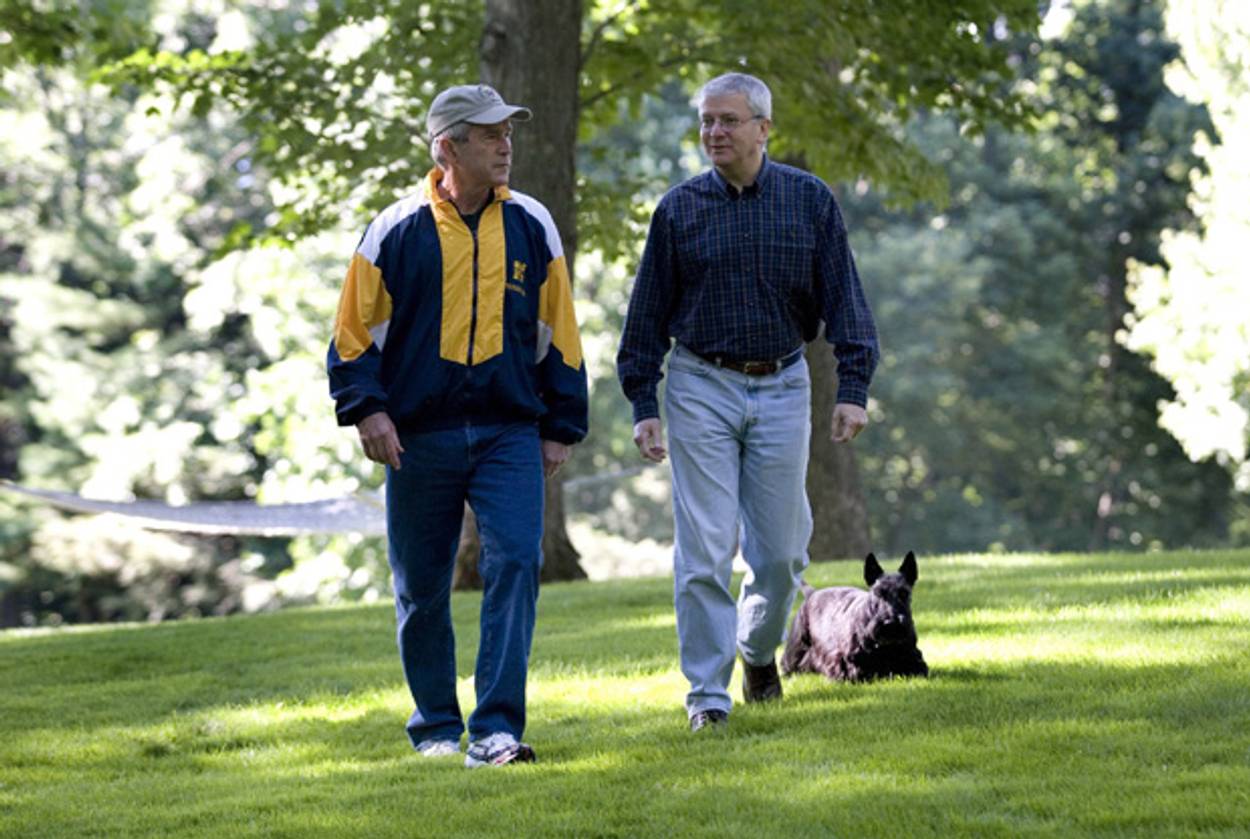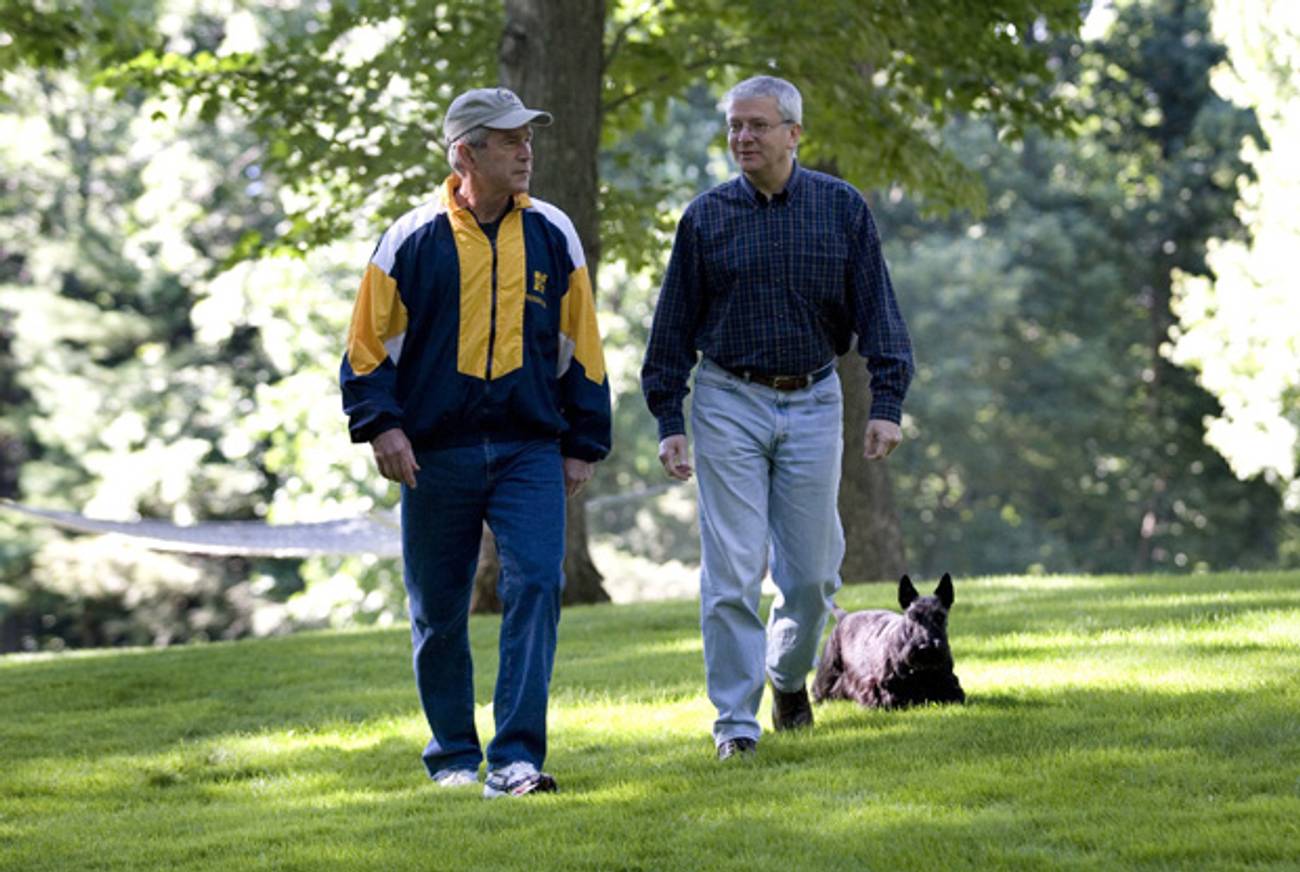Talking to W’s Chief of Staff
At the GOP convention, Josh Bolten reminisces about introducing President Bush to shmurah matzo




Joshua Bolten was only the second Jewish chief of staff in White House history; the first, Kenneth Duberstein, served Ronald Reagan. But since Bolten’s tenure under George W. Bush from 2006 to 2009, two of his three successors have also been members of the tribe: Rahm Emanuel and current chief of staff Jack Lew. “We’re on a roll,” Bolten said.
A self-described “loyal Republican,” Bolten is in Tampa for the Republican National Convention, rallying support for the ONE Campaign, the advocacy organization run by Bono that fights disease and poverty in Africa. Bolten is a member of its Board of Directors
Soft-spoken and unassuming, Bolten possesses a demeanor that belies his impressive résumé, which includes stints as director of the Office of Management and Budget, as policy director for the Bush presidential campaign, and of course as White House chief of staff. And the 58-year-old hasn’t slowed down since retiring from government in 2009. In addition to his work for the ONE Campaign, he has taught at his alma mater, Princeton, opened an international consulting firm, and currently serves as vice chairman of the board of the Holocaust Museum in Washington, D.C.—work he deems “closest to my heart.”
As is well-known to Washington insiders, Bolten’s involvement with the museum is only a small part of his deep commitment to his Jewish heritage. But while the Jewish personas of his successors Emanuel and Lew have been chronicled extensively by the media, Bolten has kept a lower profile, with most information about his Judaism and its role in his political life coming from limited second-hand accounts.
But sitting around the breakfast table Wednesday morning with Rabbi Yossie Dubrowski and his family—who run the Chabad of North Tampa and have known Bolten since Bush 43 first began campaigning in Florida for the presidency—the former chief of staff opened up about his personal faith and how his Jewishness was received by the Bush White House.
What sort of efforts did he make to bring Judaism to 1600 Pennsylvania Avenue? “You know, I actually didn’t need to work very hard,” he said. “I worked for a boss, President Bush, and the First Lady Laura Bush, who were very interested in and sensitive to other faiths. They were often cartooned as being sort of fundamentalist Christians who were disrespectful of other faiths, but the exact opposite was true.”
The first couple, Bolten recounted, “were always very interested in Jewish heritage and Jewish faith and were very receptive when we had ideas like lighting the menorah in the White House and serving the first truly kosher meal there.” Today, the kashering of the White House kitchen for Jewish events like the annual Hanukkah party has become de rigueur. But, as Bolten noted, this tradition began when Laura Bush first did so for a Holocaust Museum event.
“They were very open to and respectful of faiths of all kind, but particularly Judaism,” he said. It was a sensitivity, Bolten added, that dated back to the early days of the Bush presidential campaign in 2000, when the first lady made sure to provide special food for Bolten at campaign and staff events. “If you’re in Texas, it’s hard to go for more than a meal without pork ribs or the like on the barbecue,” he noted. “So, she always made sure that when they were serving pork that there’d be a mushroom on the grill for me.” He laughed. “I became famous for my big portobello mushroom burgers.”
Bolten also revealed for the first time a great sacrifice made by W for the sake of the Jewish faith: eating matzo. “Before Passover, Rabbi Dubrowski would always send me this special shmurah matzo made by his father, and I would always take a piece down to the Oval Office,” he recalled. “And I can’t say President Bush liked it—he would always say, ‘Gosh, it’s dry!’—but every year he was proud to eat it.”
The bread of affliction wasn’t the only form of Jewish holiday cheer Bolten helped bring to the White House. “I don’t know if people know, but for Hanukkah every year at the senior staff meeting, I handed out dreidels and gelt and then instructions on how to play,” he said. “And so for the rest of the week, probably dozens of important White House decisions were made based on a spin of the dreidel.”
Though Bolten isn’t on any short-lists for jobs in a potential Romney Administration, he speaks about his time in public service with tremendous pride. “It’s a calling,” he said. “I’ve always felt that way about government service. I think it’s the responsibility of citizens, especially Jews, to take up the calling when they have the opportunity.”
***
Like this article? Sign up for our Daily Digest to get Tablet Magazine’s new content in your inbox each morning.
Yair Rosenberg is a senior writer at Tablet. Subscribe to his newsletter, and follow him on Twitter and Facebook.
Yair Rosenberg is a senior writer at Tablet. Subscribe to his newsletter, listen to his music, and follow him on Twitter and Facebook.